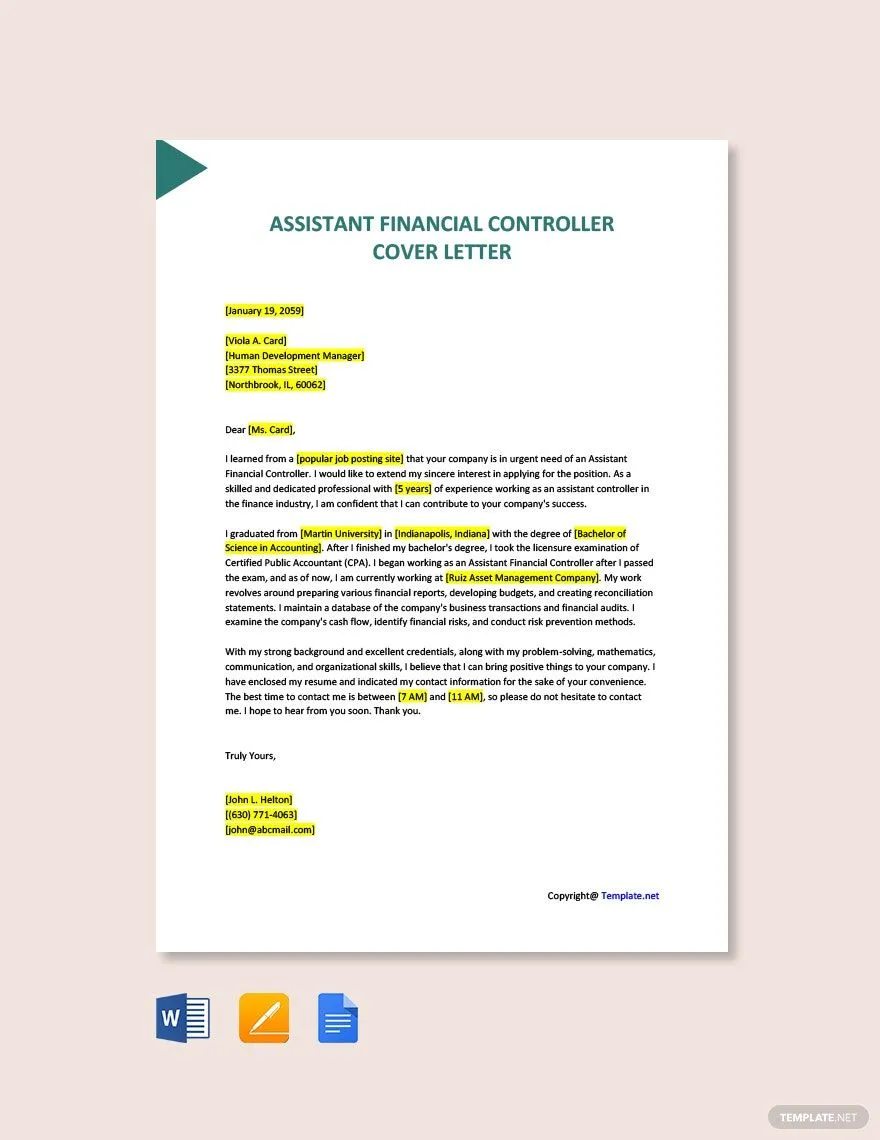Why You Need a Finance Controller Cover Letter
A finance controller cover letter is more than just a formality; it’s your opportunity to make a compelling first impression and demonstrate your suitability for the role. In a competitive job market, a well-crafted cover letter can set you apart from other applicants by highlighting your key skills, experiences, and achievements in a way that a resume alone cannot. It allows you to tell a story about your career, showcasing how your previous roles have prepared you to excel as a finance controller. A strong cover letter provides context to your resume, explaining why you’re the perfect fit for the specific company and position. This is your chance to directly address the hiring manager, express your enthusiasm, and convince them to invite you for an interview. Neglecting a cover letter, or submitting a generic one, can be a significant disadvantage, potentially leading your application to be overlooked. It’s an essential tool for showcasing your personality, communication skills, and genuine interest in the opportunity.
Essential Components of a Finance Controller Cover Letter
To create a winning finance controller cover letter, several key components must be included. These elements work together to present a professional and persuasive argument for your candidacy. Omission of any of these could weaken your application. Pay close attention to detail when crafting each component.
Contact Information and Date
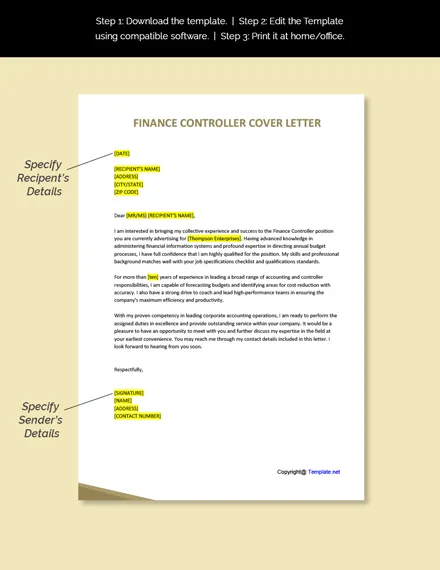
Start your cover letter by including your contact information at the top, aligned to the left or right. Include your full name, phone number, professional email address, and LinkedIn profile URL (if applicable). Below your contact information, add the current date. This sets a professional tone and makes it easy for the hiring manager to reach you.
The Recipient’s Details
If possible, address your cover letter to a specific person. Research the hiring manager’s name and title. If you can’t find a specific name, use a professional title such as ‘Hiring Manager’. Include the recipient’s title, the company name, and the company’s address below the date. Addressing your letter to a specific person shows that you’ve done your research and are genuinely interested in the opportunity.
Professional Greeting
Use a professional greeting such as ‘Dear Mr./Ms. [Last Name]’ if you know the hiring manager’s name. If you don’t know the name, use ‘Dear Hiring Manager’. Avoid generic greetings like ‘To Whom It May Concern’ as they can make your letter feel impersonal. The greeting sets the tone for your communication and should be courteous and respectful.
Highlighting Your Key Skills and Experience
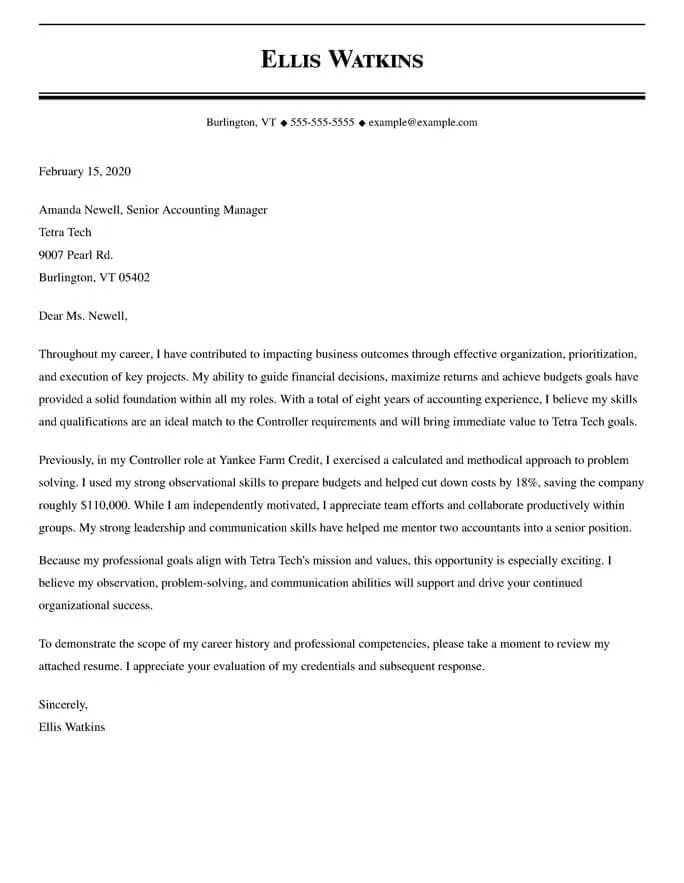
The body of your cover letter is where you showcase your skills and experience. Focus on how your expertise aligns with the job description. Use specific examples to illustrate your accomplishments and quantify your achievements whenever possible. Avoid simply restating your resume; instead, provide context and demonstrate the impact of your work. The goal is to convince the hiring manager that you are a top candidate by providing detailed, relevant examples.
Financial Reporting Expertise
As a finance controller, proficiency in financial reporting is crucial. Highlight your experience in preparing financial statements, ensuring accuracy, and compliance with accounting standards. Mention any experience with GAAP, IFRS, or other relevant regulations. Provide examples of how you’ve improved reporting processes or ensured accurate financial data, showcasing your ability to manage and interpret financial information effectively. Demonstrate your understanding of financial reporting principles and your commitment to maintaining high standards of accuracy and compliance.
Budgeting and Forecasting Proficiency
Finance controllers play a vital role in budgeting and forecasting. Describe your experience in developing and managing budgets, analyzing financial data, and forecasting future performance. Quantify your achievements, such as the percentage of budget accuracy you maintained or any cost savings you achieved through effective forecasting. Emphasize your ability to create financial models, analyze variances, and provide insights to improve financial performance. Showing you can accurately predict the future of financial needs will prove you are the perfect fit for the job.
Team Leadership and Management
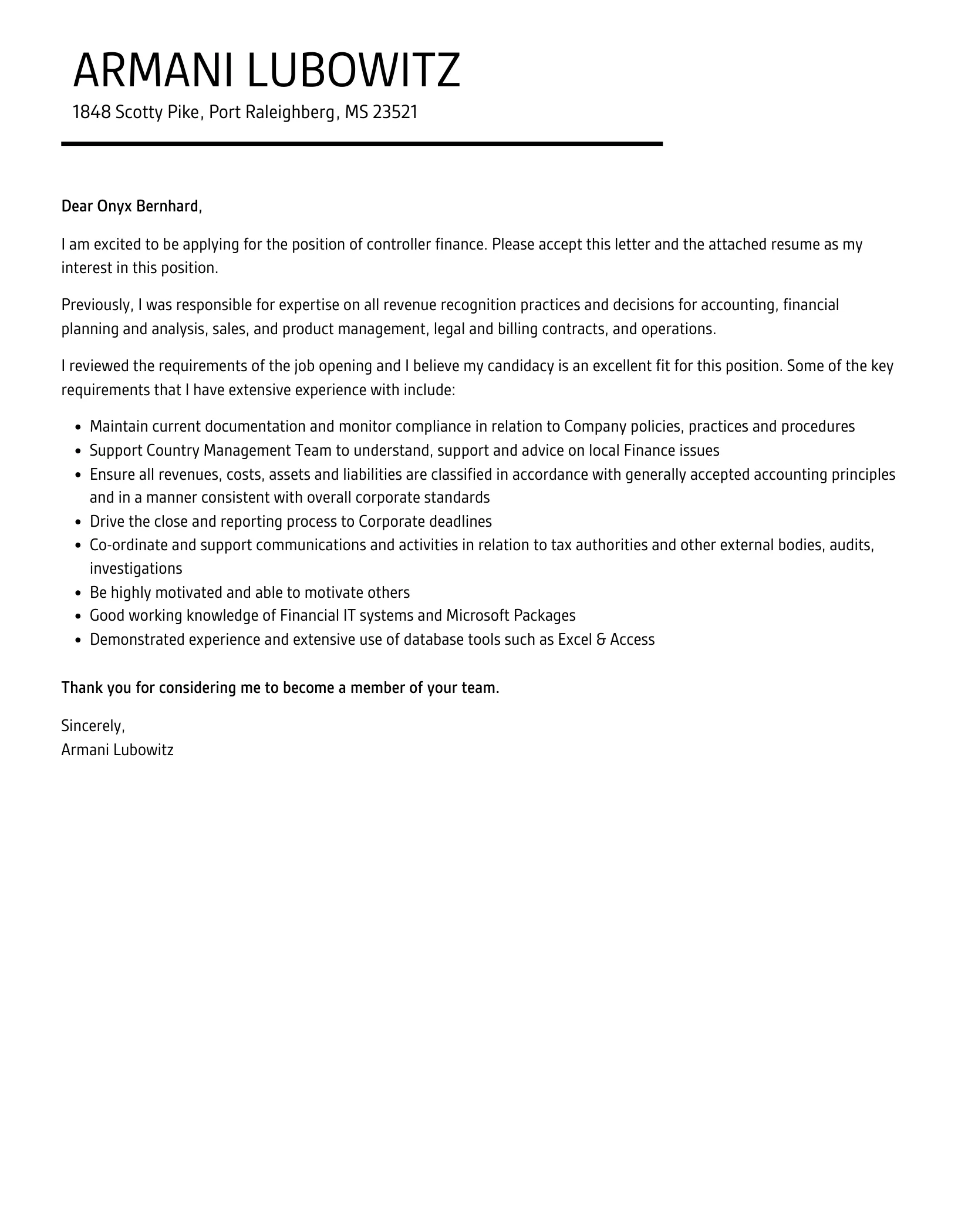
Finance controllers often lead teams. Highlight your leadership experience, including your ability to motivate and manage finance teams. Provide examples of how you’ve trained and developed team members, fostered a positive work environment, and improved team performance. Mention any experience in hiring, performance management, or conflict resolution. Emphasize your communication skills and your ability to collaborate with other departments to achieve financial goals. Your cover letter should make it evident that you can oversee the financial well-being of the company and its staff.
Quantifiable Achievements
Always include quantifiable achievements to demonstrate your impact in previous roles. Use numbers to illustrate your accomplishments. For instance, mention cost savings, revenue growth, process improvements, or efficiency gains. Use metrics like ‘reduced costs by 15%’, ‘increased revenue by 10%’, or ‘improved financial close process by 20%’. Numbers give concrete proof of your capabilities. These figures make your accomplishments more impactful and provide a clear understanding of your value. They help you stand out from other candidates.
Tailoring Your Cover Letter to the Job Description
Customizing your cover letter to each specific job application is crucial. Carefully read the job description and identify the key requirements, skills, and qualifications the employer is seeking. Then, highlight how your experience and skills align with these requirements. Use keywords from the job description throughout your cover letter to show you have the necessary qualifications. This demonstrates your attention to detail and your understanding of what the employer is looking for. Make sure you provide specific examples that demonstrate your ability to meet those requirements, which makes your letter more relevant and increases your chances of getting an interview. This is your chance to show you read the job description from start to finish.
Researching the Company and the Role
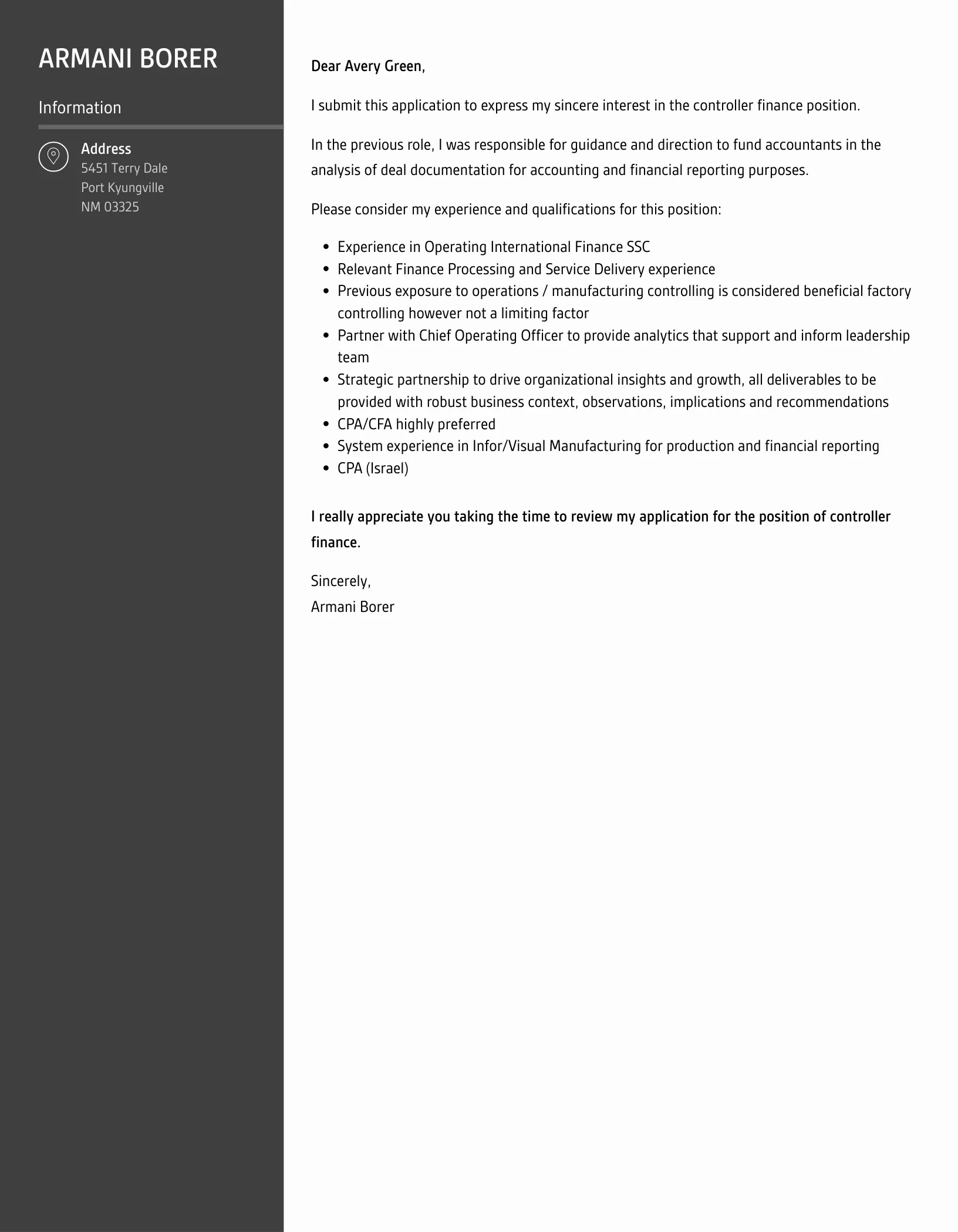
Researching the company and the specific role is an important step in customizing your cover letter. Understand the company’s mission, values, and recent activities. Tailor your letter to show you understand their business and how you can contribute to their success. Mention the company’s products or services and their position in the market. Demonstrate your familiarity with the industry and any challenges the company may face. This shows genuine interest and that you’ve thought about how your skills can benefit the organization.
Using Keywords Effectively
Use keywords from the job description throughout your cover letter. These keywords are often used by applicant tracking systems (ATS) to screen applications. Incorporating these terms helps your application pass through the initial screening process. Integrate these keywords naturally and relevantly into your descriptions of skills, experiences, and accomplishments. Avoid keyword stuffing, as this can make your letter sound unnatural and less appealing. The aim is to strategically incorporate the relevant keywords to show you match the job requirements.
Structuring Your Cover Letter for Impact
A well-structured cover letter is easy to read and highlights your key qualifications effectively. The way you organize your letter can greatly influence how the hiring manager perceives you. Good structure helps in conveying your qualifications and keeps the reader engaged. Pay close attention to how your thoughts are presented, making sure your application flows logically. Structuring your cover letter correctly increases your chances of securing an interview.
The Opening Paragraph
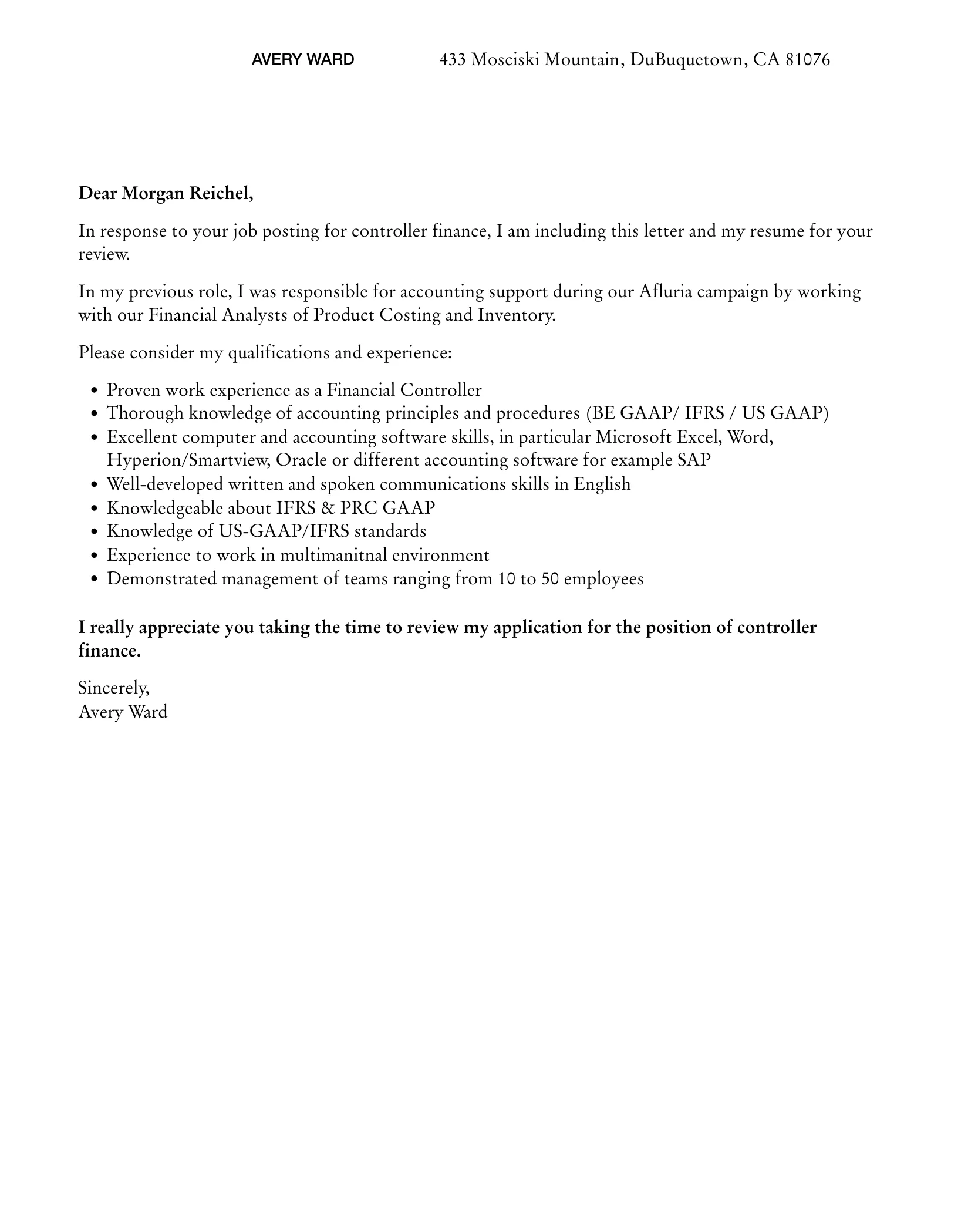
The opening paragraph is your chance to grab the reader’s attention. State the position you are applying for and how you learned about the opportunity. Briefly mention why you are interested in the role and what makes you a good fit. Make it clear and concise and express your enthusiasm. The opening paragraph should capture the reader’s interest, setting the tone for the rest of your letter. This is where you make the first impression. Your first sentence must be great.
Body Paragraphs
The body paragraphs should elaborate on your skills and experience. Use multiple paragraphs to discuss different aspects of your qualifications. Focus on your achievements and provide specific examples to demonstrate your capabilities. Tailor these paragraphs to the job description, highlighting the most relevant skills and experiences. Each paragraph should focus on a particular skill or accomplishment, using clear language and strong action verbs. This section should be a detailed overview of your professional life, showing the reader you are more than qualified for the job.
The Closing Paragraph
The closing paragraph should summarize your interest in the position and reiterate your qualifications. Express your enthusiasm for the opportunity and thank the hiring manager for their time and consideration. Include a call to action, such as stating that you are available for an interview and look forward to hearing from them. Keep the closing paragraph concise and professional, leaving the hiring manager with a positive impression of you and your application. This is your final opportunity to leave a good impression and encourage the hiring manager to move forward with your application.
Formatting and Proofreading Your Cover Letter
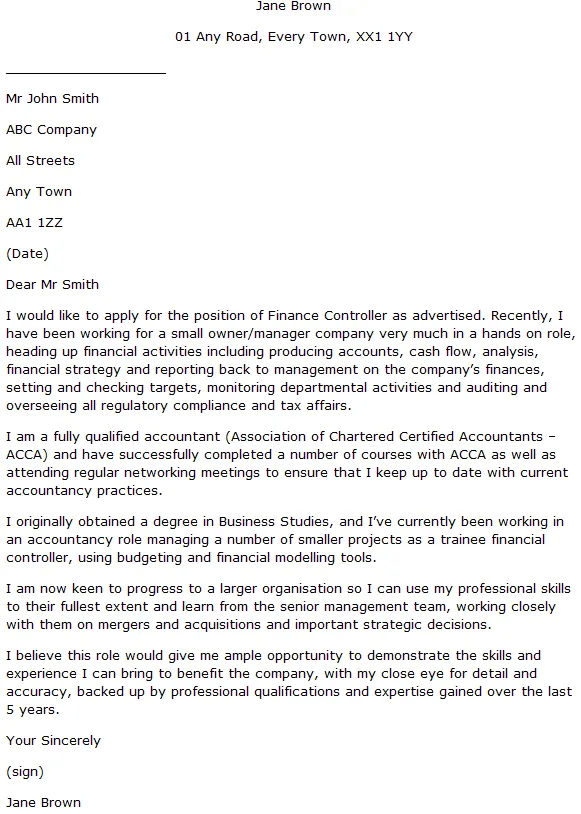
Attention to formatting and proofreading are vital for a professional cover letter. The way your letter looks and reads impacts the hiring manager’s perception of you. Proper formatting enhances readability and makes your letter more appealing. Meticulous proofreading eliminates errors, showing your attention to detail. Errors can undermine your credibility and lead to the rejection of your application. Investing time in these areas significantly improves your chances of success.
Font and Layout
Choose a professional and readable font, such as Times New Roman, Arial, or Calibri. Use a font size between 10 and 12 points. Maintain consistent formatting throughout the document, including margins, line spacing, and paragraph spacing. Use a clear layout with appropriate headings and bullet points to make your letter easy to read and navigate. A clean and well-organized layout demonstrates your professionalism and attention to detail. Your presentation should be clean, simple, and easy on the eyes.
Proofreading for Errors
Proofread your cover letter carefully for any spelling, grammar, or punctuation errors. Use a spell-checker and grammar-checker, but also read the letter yourself, as these tools may not catch all errors. Ask someone else to proofread your letter to provide a fresh perspective. Errors, no matter how small, can damage your credibility. Take the time to ensure your letter is polished and error-free. Ensure your punctuation, grammar, and sentence structure are perfect. Take your time and review every part of the document.
Making a Strong Impression
Your cover letter should convey your personality and genuine interest in the role. While maintaining a professional tone, you want to show enthusiasm for the position and the company. Make sure to demonstrate your understanding of the company’s needs and how you can contribute to their success. Your goal is to connect with the hiring manager, making them feel that you are more than just a qualified candidate but also a great fit for the company culture. Make your letter memorable. Ensure your letter accurately reflects who you are as a professional.
Call to Action
Include a clear call to action at the end of your cover letter. State your availability for an interview and express your interest in discussing the position further. Make it easy for the hiring manager to take the next step by providing your contact information. Reiterate your enthusiasm for the opportunity and thank the hiring manager for their time and consideration. The goal is to prompt the hiring manager to reach out to you for an interview.
Expressing Enthusiasm
Show enthusiasm for the position and the company throughout your cover letter. Express your genuine interest in the role and explain why you are excited about the opportunity. Demonstrate that you have researched the company and are genuinely interested in their mission and values. This enthusiasm should be evident in your language and tone, making your application stand out from others. Use strong verbs and passionate language to create a positive impression and increase your chances of being selected for an interview.
Following Up After Submission
After submitting your cover letter and resume, follow up with the hiring manager. Send a thank-you email a few days after the interview. This demonstrates your continued interest and professionalism. Following up reminds the hiring manager of your application and allows you to reiterate your interest in the position. This simple act can sometimes make the difference between getting an interview and not getting one. Be professional and use the right tone when following up.
